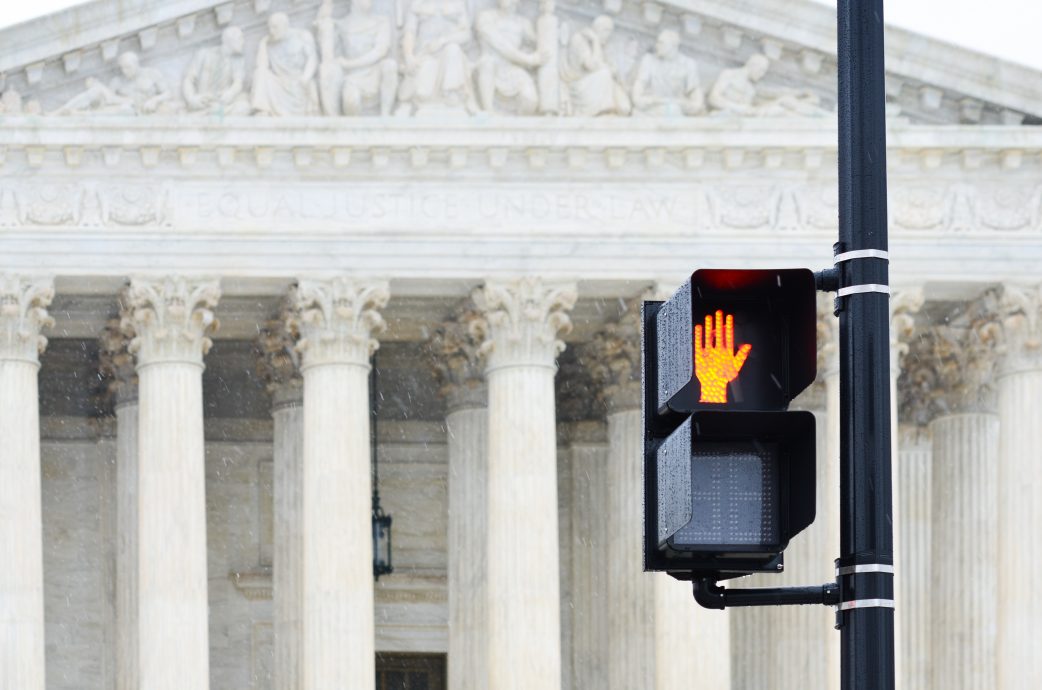Rational choice theory might help explain why James Madison thought a little chaos could be good for democracy.
Crony Capitalism and the Trouble with Heightened Judicial Review
When, in the 1930s, the U.S. Supreme Court began to back away from heightened judicial scrutiny of economic legislation under its substantive due process doctrine, the question remained whether application of the doctrine to review non-economic policies, for example, parental rights to send their children to Catholic schools or instruct them in foreign languages, would be waved off by the Court as well. Progressives wanted the government to have a freer hand in regulating economic life, but nonetheless wanted judges to continue to continue to check government actions in the non-economic realms. How to justify different judicial treatment of legislation?
The best-known answer to the question came in Footnote Four in Justice Stone’s 1938 opinion for the Court in United States v. Carolene Products Co. The most famous footnote in constitutional adjudication, the footnote posits three different justifications in each of its three paragraphs for continuing, heightened review of specific forms of legislation.
The first, and least interesting paragraph, reportedly added to the original draft of the footnote at the behest of Chief Justice Hughes, advances the thoroughly unprincipled position that certain rights should continue to be preferentially enforced by the judiciary. At first glance the paragraph might seem to commend non-preferential application of all of the Bill of Rights, “There may be narrower scope for operation of the presumption of constitutionality when legislation appears on its face to be within a specific prohibition of the Constitution, such as those of the first ten amendments.” The remainder of the sentence, however, belies that notion by a clear, if implicit, invocation of selective (i.e., preferential) incorporation of the Bill of Rights via the Fourteenth Amendment. The sentence continues, “which are deemed equally specific when held to be embraced within the Fourteenth.” Not all rights at the time, or today, are “deemed equally specific.” Just certain privileged ones.
Louis Lusky, Stone’s law clerk during the term, and who later acknowledged originating the original two paragraphs of the footnote, couldn’t ever quite forgive Hughes for messing up the logic of the footnote by asking Stone to include the first paragraph.
The second and third paragraphs, both of which composed the original footnote, provide the most interesting theory for heightened judicial scrutiny. They identify means by which the (ostensibly) self-correcting process of democratic government can be legislatively derailed, and thus justify judicial intervention in the argument of the footnote. Restrictions on speech, press and assembly are addressed in the second paragraph. If these are legislatively blocked, the argument goes, then the process by which a new popular majority might form to repeal the legislation are short circuited. In these cases, then, judges should use their countermajoritarian veto. But they do so in order to sustain democratic processes and outcomes rather than to set them aside.
The third paragraph, the footnote’s most quoted line, suggests that “prejudice against discrete and insular minorities may be a special condition, which tends seriously to curtail the operation of those political processes ordinarily to be relied upon to protect minorities,” and therefore might call for the continuation of heightened judicial scrutiny despite its rejection in application to economic policy.
An irony in the footnote is that the only precedent cases cited on judicial intervention in response to the failure of democratic processes are, in fact, two cases challenging economic policies. The first, McCulloch v. Maryland, decided in 1819, relates to intergovernmental tax immunity. The second, South Carolina v. Barnwell Brothers, is a 1938 dormant commerce clause case. Barnwell has its own, suggestive footnote that anticipates the theory advanced later in the Court’s term in Carolene Products:
Underlying the stated rule has been the thought, often expressed in judicial opinion, that when the regulation is of such a character that its burden falls principally upon those without the state, legislative action is not likely to be subjected to those political restraints which are normally exerted on legislation where it affects adversely some interests within the state.
Two items of particular note.
First, the economic/non-economic mapping for heightened scrutiny doesn’t really flow from the logic of Carolene Products. It’s process failure that triggers heightened review in the argument of the footnote and its sources, no matter the substantive policy domain. So, if normal democratic processes cannot be expected to alleviate, say, discriminatory tax treatment of non-mobile capital, then heightened scrutiny should be triggered. “Process failure” versus “no process failure” is the real distinction in the footnote, not economic versus non-economic.
Secondly, we can ask whether the conventional economic/non-economic reading of the footnote misses the broader scope of “special circumstances” that can systematically generate unjust outcomes. To wit, the direct material gains for economic winners of legislative statutes and bureaucratic regulations, the winners of rent seeking and crony capitalism, should itself be considered a “special circumstance” that justifies the continuation of heightened scrutiny of ordinary economic legislation, not its discontinuation.
In James Madison’s famous Federalist 10, Madison clicks off numerous causes of faction. Yet he highlights economics as the most notable cause of faction:
But the most common and durable source of factions has been the various and unequal distribution of property. Those who hold and those who are without property have ever formed distinct interests in society. . . . The regulation of these various and interfering interests forms the principal task of modern legislation, and involves the spirit of party and faction in the necessary and ordinary operations of the government. . . . Every shilling with which they overburden the inferior number, is a shilling saved to their own pockets.
But what of the fact that Madison also suggests his own solution in Federalist 10, namely enlarging the scope of the union?
The response misses the point. The question is what justifies different levels of judicial scrutiny for economic legislation relative to non-economic legislation. To the extent that we’re to take Madison’s solution in Federalist 10 as sauce for the economic goose, then it’s also sauce for the non-economic gander. Madison’s argument does not justify two-tiered judicial review.
Secondly, we might note that Madison’s solution in Federalist 10 is union. The implication being that purely intrastate politics do not have the process benefit of resulting from majorities of minorities created by national union. Indeed, the Fourteenth Amendment itself might be viewed as derived from the need of the broader union to intervene against oppressive intrastate factions.
Finally, there is self-interest itself. That majorities, and connected minorities, can gain materially and directly from economic legislation (think again of rent seeking and crony capitalism) in ways that those advocating legislation against, Catholic schools or foreign language teaching, do not. The point is not at all that the former is bad while the latter is tolerable. Rather, the point goes to what justifies the unequal judicial treatment of the different categories. Might not “direct material gain” be fairly considered a special circumstance that can systematically prompt the adoption of unfair or discriminatory economic policies? Cannot economic self-interest motivate oppressive legislation as readily as religious animus? In which case, perhaps auxiliary precautions beyond normal democratic processes, such as heightened judicial review, is justified for economic legislation as well as for non-economic legislation.



